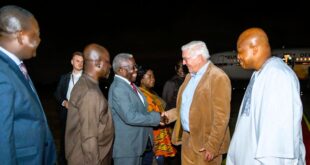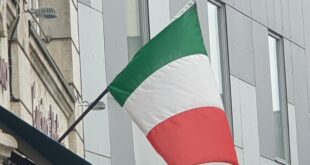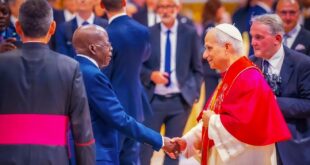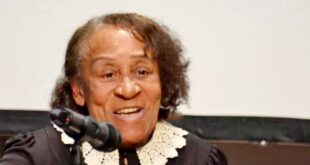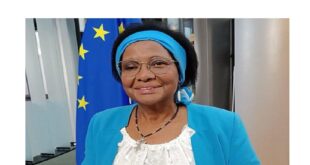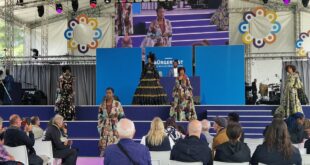What is it like to be a Black person living in Germany? What does it mean to be excluded from your own society? Prominent guests met recently to discuss these questions and more at the launch of the new multimedia project ‘Afro.Germany’ by the German international broadcaster Deutsche Welle (DW).
“I used to want to be white,” says Jana Pareigis, speaking with rapper Samy Deluxe. She wanted to know if it was like that for him, as well. “As a child, yes,” he says. “But as a teen, I wanted to really be Black.”
The dialogue is a scene from the movie “Afro.Germany,” in which TV host Jana Pareigis travelled throughout Germany visiting Black people and hearing their stories about what it’s like to be Black in Germany. They shared stories from their childhoods, and explained how they identified themselves and why they are proud of their skin colour.
Among those interviewed are prominent figures like football star Gerald Asamoah and artist Robin Rhode. Pareigis also spoke with refugee Issa Barra from Burkina Faso, as well as Indira Paarsch, who was given up for adoption by her white mother when she was a baby because she was “too black.”
Pareigis also shares anecdotes from her own life – she herself was adopted by white parents. As a child in kindergarten, her dark skin attracted attention. Even until today, people touch her hair without asking.

Racist terms should not be the norm
At the premiere of the kick-off of the DW multi-media project “Afro.Germany” on 9 March, Pareigis revealed that it was not easy for her to publicly share her own story. “It takes a lot of effort to show old photos, especially in such a heated time when people are hostile to those who help refugees. In such times one must be able to do something against this mentality and not be intimidated.”
Her statement was supported by a short presentation on the topic of racism given by Professor Dr. Wilhelm Heitmeyer, a violence and conflict researcher at the University of Bielefeld. “We have a lot to do now as right-wing populist movements continue to grow,” he said.
The biggest problem for him is the so-called “normalization process,” for example when concepts such as “ethnic,” once used by the Nazis, are again made “normal” through everyday usage. Whatever becomes “normal” at a certain point can no longer be considered problematic, says the sociologist. “If the far-right populist party AfD continues to use such phrases, at a certain point most people will no longer be offended. This is why we have to detect this kind of language ‘normalization,’ otherwise we are putting man’s dignity in jeopardy,” he said.
Germans are ashamed of everyday racism
Germany is supposed to be a tolerant country, says DW’s director, Peter Limbourg, during his opening remarks. “The German constitution forbids any type of discrimination, but is everything really OK?” When older men don’t accept footballer Jerome Boateng as a neighbour and when young people beat up refugees, then it’s not alright, he said.
“We’re far from having reached where we want to be. That’s why I’m very pleased we’ve made this film.”
The idea for this film was developed by Susanne Lenz-Gleissner with the head of DW’s cultural department, Rolf Rische. “We wanted it to be a nice film but we also wanted to discuss violence,” said Lenz-Gleissner at the event. That meant including the public and subtle violence that Black people living in Germany experience daily. “We didn’t want to demonstrate it only through political statements, but also by showing everyday racism, the kind that Germans are ashamed of.”

Racism has a long history
People of colour have been living in Germany for over 400 years. Currently, there are around one million. Theodor Wonja Michael is one of them. His family has been connected to Germany for over 100 years. The 92-year-old, who is an author and actor, grew up in the country and has become familiar with many different forms of racism throughout his lifetime. In the 1920s, he was part of a “human zoo,” where he appeared in a raffia skirt to display a “typical African lifestyle” to the public. Under the Nazis, he was cast as an extra in films that glorified the colonial years.
“One didn’t need a Jewish star – one saw right away ‘ah, a foreigner,’ ” he explains in the film. But as long as he laid low and kept his mouth shut, he continued to be cast as an extra.
“Naturally, a lot has changed since then,” he said during the event’s public discussion, adding that the basic story remained the same. “To be Black is still foreign in Germany. We still have a lot of fighting to do.”
Theodor Wonja Michael published a book on his life story and often speaks at schools. “I want people to engage with the topic of racism and do something about it.”
Inciting people of colour to political involvement
Dr Karamba Diaby shares Michael’s views. Diaby has been a member of the federal parliament for the Social Democrats since 2013 and the first Black person to do so. He often uses his notoriety to fight racism: “Whenever someone gives me a microphone to hold, I say something about it.”
He hopes that more people of colour will become politically engaged. “The majority must also understand that Germans aren’t only white,” he emphasized. An important theme for the politician is racial profiling, which occurs when for example, people of colour are asked by the police to show an identification card, or, as he himself has experienced, are stopped at a passport check at the airport while white people are not. “It’s discriminating and it hurts,” he said from the podium.
At the end of the discussion, moderator Elizabeth Shoo asked if there were positive aspects to report on Afro-German relations. “I’m glad I contribute to diversity,” said Diaby. “If we Blacks weren’t here, everyone would be quite pale.” Football player Gerald Asamoah concluded: “We Blacks are definitely cool!”
© Deutsche Welle
————————————————————
The film “Afro.Germany” will be broadcast on 26 March on DW TV. Additional interviews and background information on the topic of racism and the film’s protagonists can be found on www.dw.com/afrogermany.
 THE AFRICAN COURIER. Reporting Africa and its Diaspora! The African Courier is an international magazine published in Germany to report on Africa and the Diaspora African experience. The first issue of the bimonthly magazine appeared on the newsstands on 15 February 1998. The African Courier is a communication forum for European-African political, economic and cultural exchanges, and a voice for Africa in Europe.
THE AFRICAN COURIER. Reporting Africa and its Diaspora! The African Courier is an international magazine published in Germany to report on Africa and the Diaspora African experience. The first issue of the bimonthly magazine appeared on the newsstands on 15 February 1998. The African Courier is a communication forum for European-African political, economic and cultural exchanges, and a voice for Africa in Europe.











